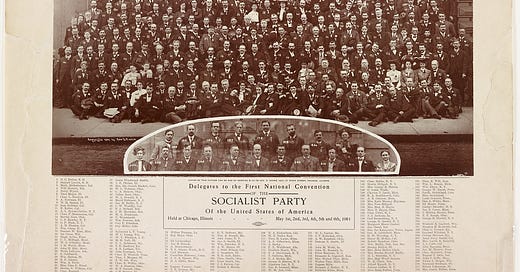Welcome to the first Debs Dispatch!
Over the weekend, I started reading David Karnser’s Talks With Debs In Terre Haute. Karnser was a Socialist Party journalist and a good friend of Debs. In 1919, he published one of the first biographies of the Socialist leader, and in 1922, after Debs was freed from prison, he took the train to Terre Haute to help Debs write a series of articles about his stint in prison. They would later become Debs’s first and only book, the posthumously published Walls and Bars.
Karsner — much to Debs’s chagrin, as it would turn out — decided to record his notes from his conversations with Debs. They captured the elder leader, he wrote, “in unguarded manner, entirely unaware that his words would reach further than the ears of his single listener.” Karsner’s subterfuge yielded some interesting quotes.
Debs on writing:
I am not a writer. I hate writing. A pen always resents getting into my hand. It seems to say, “Now what do you think you are going to do?” Ink pots have never been inviting to me, but I cannot say the same of the platform. That is my forte.
On HL Mencken:
His style is incisive, quick, sure, and he has a good bit to say. But it is all so very negative, so hopeless, so pessimistic, that when you get through reading him you wonder what life is all about and whether there is any sense in anything… There is much in Mencken that is Nietzschean.
On Oscar Wilde:
Wilde knew nothing about Socialism. He was an aristocrat, a gourmand. I am certain that Wilde could sit in a house, gorge himself on sumptuous food with the knowledge that the people living next door were in misery and starving and be undisturbed by the knowledge. Oscar Wilde, I am sure, was not a man that I should like, and I am equally sure that I am not the kind of man he would like.
On Jesus:
He was not always meek and lowly, but a full red-blooded, vibrant Jewish agitator, who could hate injustice and rebuke those who oppressed the poor and exploited and robbed them.
Some of Debs’s most revealing remarks concerned the Russian Revolution.
Debs was an early supporter of the upheaval, cheering as the Russian czar — widely regarded as an emblem of reactionary rule and despotism — was deposed. “From the crown of my head to the soles of my feet I am Bolshevik, and I am proud of it” Debs proclaimed in one widely circulated quote.
But as information from the Soviet Union trickled in through the prison walls, Debs was less than enthused. He objected to Lenin’s early crackdowns on dissent amid the civil war and, in conversations with Karsner after his release, opposed the execution of the czar.
The Russians excuse it not only on the ground that the czar and his family alive might be menacing to the revolution, but also justify their crime by pointing to the fact that the reigning imperialists were likewise guilty of brutal and hideous murders of Russian workers. For myself, there is no excuse for Socialists and free men to resurrect the archaic, Mosaic law… I believe with Thomas Paine, that we should “destroy the king, but save the man.”
Debs, appalled at the vicious fighting between socialists and communists in the US, was even more strident in criticizing the Communist International.
I am heartily in favor of every step of Russia’s revolution as long as they fight capitalism, but when they proceed to dictate to the Socialist parties of other countries as to how they should conduct themselves, then it seems to be time to back up, not lessening our full and hearty support of the Russian revolution, but in preserving the integrity of our own parties which have been built up through long years of tears, toil, and weary sacrifices.
I’ll have much more to say in later posts, but those quotes should give you taste of Debs’s complex views on the revolution: unstinting in praising the democratic opening it created, ruing the autocratic impulses that crept in well before Stalin came to power.
Image of the week
Delegates to the 1904 Socialist Party of America national convention in Chicago, IL. Debs is in the bottom center, number 207.
Housekeeping
In case you’re interested, here’s a round-up of the Debs-related work I’ve done since starting this project last year:
“Eugene Debs Believed in Socialism Because He Believed in Democracy” (my long read on Debs’s life and legacy)
“The Young Eugene Debs” (interview with Tim Davenport, coeditor of the six-volume Selected Works of Eugene Debs)
“Eugene Debs Was an American Hero” (interview with Ernest Freeburg, author of Democracy’s Prisoner: Eugene V. Debs, the Great War, and the Right to Dissent)
Several reprints of Debs’s writings, the most recent of which Jacobin published on Christmas Day: “The Real Religion of Jesus”
And finally, this mini-documentary, which drew on my Jacobin Talk and which was produced and designed by the exceptional Jacobin AV team.
That’s it for this week! Thanks so much to everyone who has subscribed already. And if you have the means, please do sign up for a paid subscription. Unfortunately the Left isn’t flush with funds like the Right, so any extra cash will really help me write my Debs biography. Until next week!




